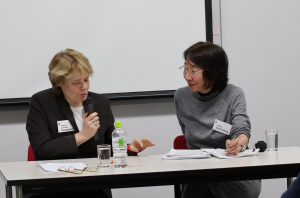イベント&アクティビティ
Politicians and Bureaucrats in Contemporary Japan: New Twists on a Tumultuous Relationship
In a state’s political system, the bureaucracy plays a pivotal role, as the efficiency of the government’s policies and the realization of the democratic principle are at stake. Since the 1990s, Japanese bureaucracy has been the target of growing criticism blaming it for administrative failures and an excess of autonomy from elected political power. In response to this criticism, a number of reforms inspired by the New Public Management movement were implemented at the beginning of the 21st century, such as the reorganisation of the ministries and the introduction of new recruitment and promotion methods.
After a brief review of these reforms, we will analyse how decision-making processes have changed in practice and how political-administrative relations during the last fifteen years have evolved.
Prisons and Forced Labour on Hokkaido

During the Meiji period the Japanese government built five prisons on Hokkaido. The inmates of these prisons largely contributed through agricultural and industrial work to the colonization and development of the northern island.
Drawing on historical sources such as prison year books and accounts of eye witnesses, this talk analyses the relation between prisons and settler society during Hokkaido’s colonization process. The research findings evidence how prison labour changed according to changes in local government.
From Flexible Rigidities to Embracing Diversity? Work-related Diversity and its Implications in Japan and Beyond

Are we about to witness fundamental changes to established work practices or just the addition of ‘non-standard’ options to a fundamentally outdated system? – Observers of recent work-related regulations of the Japanese government are divided on whether the country really is on its way to a place where women and other ‘atypical’ employees can shine, or whether the latter are just supposed to stabilize a system that always treated them as second-rate members.
In this panel, we bring together a German and a Japanese expert on diversity issues in order to evaluate current political and societal trends towards a more diverse work force and, by extension, a more diverse society. By contrasting insider and outsider perspectives as well as academic and practical views both speakers will provide the audience with new insights on the opportunities and risks growing diversity entails for Japanese companies, employees, politics, and the country at large.
DIJ International Conference: “From Flexible Rigidities to Embracing Diversity? – Work-Related Diversity and its Implications in Japan and Beyond”
This conference brings together international experts and scholars from several academic disciplines who analyze processes of work-related diversity in Japan and other advanced economies. By combining a range of approaches and by comparing countries and case studies, the conference seeks to lay the ground for a comprehensive empirical picture of the various facets of work-related diversity in Japan and beyond and how it affects and is affected by established work practices.
Outgrowing the “triple helix” – The effects of international cooperation on the emergence of Japanese regional high-tech innovation clusters
Regional economic disparities, rapid ageing, low GDP growth, and the increasing importance of science-based industries induced a major shift in Japanese innovation policy over the last decades. Regional innovation clusters with collaborative research between universities and surrounding companies at their core, promising radical high-tech novelties with the potential for start-ups, have become the target of recent policy efforts and subsidy programs.
Compared to “market-based” systems such as the Anglo-Saxon economies, Japan’s “coordinated capitalism” (e.g. Streeck, Yamamura 2003) is typically associated with institutional constraints on radical innovation, like a lack of venture capital or a rigid labor protection regime. This research demonstrates the onset of significant institutional changes in Japan’s innovation regime.
The transfer of knowledge between Germany and Japan in the late Meiji and early Taishō eras: A case study of Georg Würfel (1880-1936)

In the late Meiji era the system of hiring foreign contract workers (o-yatoi gaikokujin) to educate Japanese intellectuals came to an end. Instead of working at universities, foreign teachers were increasingly employed at university preparation schools (kōtō gakkō). In order to examine the German-Japanese transfer of knowledge in the late Meiji and the Taishō eras, this paper draws on an in-depth study of several German teachers living and working in Japan during this time. The research objective is to compare the situation of professors in Tokyo under the o-yatoi system to the situation of teachers at the new preparation schools.
This talk will focus on the example of Georg Würfel who came to Tokyo in 1906 as a missionary and stayed as a teacher in Sendai, Miyagi, until his death in 1936. While he is rarely ever mentioned by his contemporary fellow Germans in Japan in their writings, Würfel influenced several thousand Japanese students and he was often also their first contact with a foreigner.
Japan votes (again): A review of the Lower House election 2017

On October 22 Japan is heading to the polls for the third time in 5 years. The 2017 snap election has given candidates and parties little time to prepare and has made it difficult for observers to predict results as Japan’s party system seems once again in flux.
In his lecture Koichi Nakano, professor of political science at Sophia University, will provide an overview of key events and movements in the run-up to the election, the prospect for further developments in the party system and their impact on the issue of constitutional revision.
Chris Winkler, lecturer in Japanese politics at Hokkaido University, will offer some preliminary explanations of parties’ individual performances and what the election results mean for the Abe government’s agenda.
School’s out Forever – Examining Career Guidance and Transition Mechanisms at Japanese Senior High Schools

Irregular employment and average job turnover rates have been increasing for many years in Japan. At the same time, a shift from a credential society (gakureki shakai) to a learning capital society can be observed. According to Kariya (2010) this results in three challenges: (a) an increasing performance pressure on young people, (b) the emergence of a new dynamic of class cleavage and (c) a shift to a flexible labor regime. Once a defining characteristic of Japan’s credential society educational achievements no longer reliably translate into desirable occupational success (Tachibanaki 2006). Employment in unstable and low-pay jobs, reduced career mobility, and fragmented work biographies have so far often been explained with insufficient education (Honda 2004). However, this neglects the uneven distribution of critical factors for success in the job market, such as the educational opportunities schools offer and individual learning competencies.








 Open Access
Open Access
